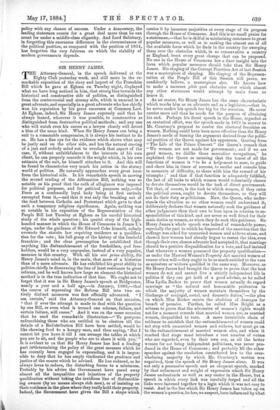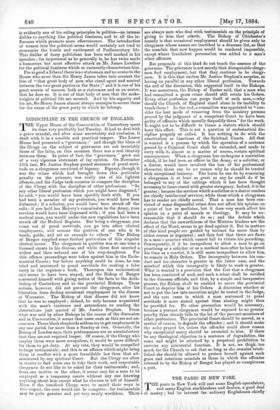SIR HENRY JAMES.
THE Attorney-General, in the speech delivered at the Eighty Club yesterday week, and still more in the re- markable exposition of the story and import of the Franchise Bill which he gave at Egham on Tuesday night, displayed what we have long noticed in him, that strorg bias towards the historical and constructive side of politics, as distinguished from the controversial and stormy side, which is unusual in a great advocate, and especially in a great advocate who has chiefly won his reputation by his great successes at Common Law. At Egham, indeed, Sir Henry James expressly said that he always leaned, wherever it was possible, to constructive as distinguished from destructive political methods ; and any one who will watch even his career as a lawyer closely will detect a bias of the same kind. When Sir Henry James can bring a snit to a reasonable compromise, it is always his instinct to do so. He has a fine eye for the evidence which shows what may be justly said on the other side, and has the natural craving of a just and orderly mind not to overlook that aspect of the case, if, without unfaithfulness to the interests of his own client, he can properly concede it the weight which, in his own estimate of the suit, he himself attaches to it. And this will be found to characterise very much his action in the stormy world of politics. He naturally approaches every great issue from the historical side. In his remarkable speech in moving the second reading of the Affirmation Bill, nothing was so notable as his proof that the oath of allegiance was imposed for political purposes, and for political purposes only,—the Peers as a confessedly loyal body being at first entirely exempted from it,—and that it was only the breaking out of the feud between Catholic and Protestant which gave to that oath a temporary religions significance. Again, nothing was so notable in his exposition of the Representation of the People Bill last Tuesday at Egham as his careful historical study of the whole question • his quaint story of the high- handed manner in which the House of Commons in James I.'s reign, under the guidance of Sir Edward Coke himself, calmly overrode the statute law requiring residence as a qualifica- tion for the vote ; his full grasp of the history of the freehold franchise ; and the clear presumption he established that anything like disfranchisement of the freeholders, pa free- holders, would be a very unpopular, instead of a very popular, measure in this country. With all his nisi prius ability, Sir Henry James's mind is, in the main, that more of a historian than of a mere advocate. He has exhibited his great ability in politics chiefly in discovering the line of least resistance to great reforms, and he well knows how large an element the historical method is in the true indication of that line. We ought not to forget that it was in Sir Henry James's speech at Bridgwater, nearly a year and a half ago,—in January, 1883,—that the couree of separating the Reform Bill into two en- tirely distinct measures was first officially advocated. "I am certain," said the Attorney-General on that occasion, "that if ever the attempt is made to deal with the question by one Bill, or even what is termed one scheme, failure, and certain failure, will ensue." And it was on the same occasion that he used the remarkable illustration—" To postpone enfranchising those who are entitled to be electors till the details of a Redistribution Bill have been settled, would be like showing food to a hungry man, and then saying, But I cannot let you have it till I can arrange the tables at which you are to sit, and the people who are to share it with you.'" It is evident to us that Sir Henry James has had a leading part in•determining the policy of the great measure which he has recently been engaged in expounding, and it is impos- sible to deny that he has amply vindicated the prudence and justice of the course which he advised. He has reduced, as he always loves to reduce, the disturbing forces to a minimum. Probably by his advice the Government have pared away almost all the inequalities and injustices of the property
qualification without taking the invidious line of disfranchis- ing owners (by no means always rich men), or of insisting on
their residence in the place where they really hold their property. Indeed, the Government have given the Bill a shape which carries it by immense majorities at every stage of its progress through the House of Commons. And this is no small praise for a statesman,—that he is skilful in minimising resistance to great popular measures, as well as in making the utmost use of all the available force which he finds in the country for sweeping them over the obstacles which, in so conservative a country as England, beset every great change that can be proposed. No one in the House of Commons has a finer insight into the form which popular measures should take than Sir Henry James. His shaping of the Corrupt Practices Act of last Session was a masterpiece of shaping. His shaping of the Represen- tation. of the People Bill of this Session will prove, we confidently believe, a masterpiece also. He knows how to make a measure glide past obstacles over which almost any other statesman would attempt by main force to heave it.
As an orator, Sir Henry James has the same characteristic which marks him as an advocate and as a legislator,—that is, he never makes his speech too big for the occasion. He never carries more sail than he needs for the purpose of obtaining his end. Perhaps his finest speech in the House, regarded as an oratorical effort, was the speech made in 1879 in answer to Mr. Courtney's proposal to confer the electoral franchise on women. Nothing could have been more effective than Sir Henry James's mode of turning the argument derived from the politi- cal position of the Queen against his opponents. Quoting from "The Life of the Prince Consort" the Queen's remark that "We women are not made for government; and if we are good women, we dislike these masculine occupations," he explained the Queen as meaning that the truest of all the functions of women is "to be a help-meet to man, to guide and cheer him in times of success, to soothe and console him in moments of difficulty, to share with him the reward of his triumphs ;" and that if that function is adequately fulfilled, the last of all tasks to which women would voluntarily choose to devote themselves would be the task of direct government. Yet that, of course, is the task to which women, if they enter the political arena, ought to devote themselves, or they will not do their duty as politicians. Now, the Queen, who under- stands the situation as no other woman could understand it, deliberately declares that women naturally seek the guidance of other judgments than their own to lean upon in relation to re- sponsibilities of this kind, and are never so well fitted for their main duties as women, as when they do seek this guidance. Sir Henry James's whole speech was indeed of remarkable power, especially the part in which he disposed of the assertion that the suffrage was asked for unmarried women and widows alone, and showed how women had already begun to resent the idea, even though their own chosen advocate had accepted it, that marriage should be a positive disqualification for a vote, and had insisted that whenever a woman possessed the property qualification— as under the Married Women's Property Act married women of course often will—they ought to be as much entitled to the vote as spinsters or widowsqualified in the same way. Moreover, as Sir Henry James had brought the Queen to prove that the best women do not and cannot live a strictly independent life in politics if they can get hold of a good adviser, so he called Miss Lydia Becker to prove that women actually do regard marriage as "the natural and honourable profession in which the majority of women maintain themselves by the discharge of conjugal, social, and domestic duties,"—the plea on which Miss Becker resists the abolition of damages for breach of promise. Further, he called Miss Bright as a witness to prove that the advocates of women's rights would not for a moment concede that married women are, as married women, disqualified to vote. A more irresistible chain of evidence to establish that the enfranchisement of women could not stop with unmarried women and widows, but must go on to the enfranchisement of married women also, and when it reached that stage must introduce a vast number of voters who are regarded, even by their own sex, as all the better women for not being independent politicians, was never pro- duced in the House of Commons ; and probablvIll the other speeches against the resolution contributed less to the over- whelming majority by which Mr. Courtney's motion was negatived, than the speech of Sir Henry James alone. It was not only a persuasive speech and an eloquent speech, marked by that refinement and weight of expression which Sir Henry James understands as well as any orator in the House, but a speech in which every link was carefully forged and all the links were fastened together by a logic which it was not easy to resist. And in the line which Sir Henry James has taken up on the women's question, he has, we suspect, been influenced by what
dislike to anything like political fussiness, and to all the in- fluences which promote mere effervescence. The introduction of women into the political arena would certainly not tend to economise the bustle and excitement of Parliamentary life. This dislike of fussy politicians has been well marked in his speeches ; for impersonal as he generally is, he has twice made a humorous but most effective attack on Mr. James Lowther for the political fussiness which so eminently characterises him.
For so good a Liberal there is no statesman and no orator in the House who more than Sir Henry James takes into account the bias of "that great body of men who stand apart and neutral between the two great parties in the State ;" and it is one of his great secrets of success, both as a statesman and as an orator, that he does so. It is out of that body of men that the make- weights of political life are secured. And by his sagacity and his art, Sir Henry James almost always manages to secure them for the cause of the great party to which he belongs.



































 Previous page
Previous page